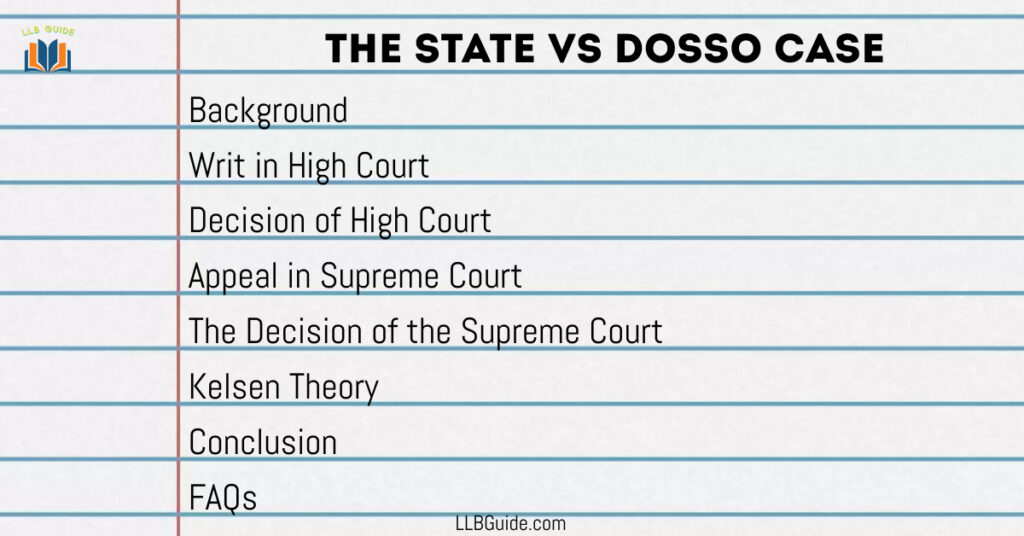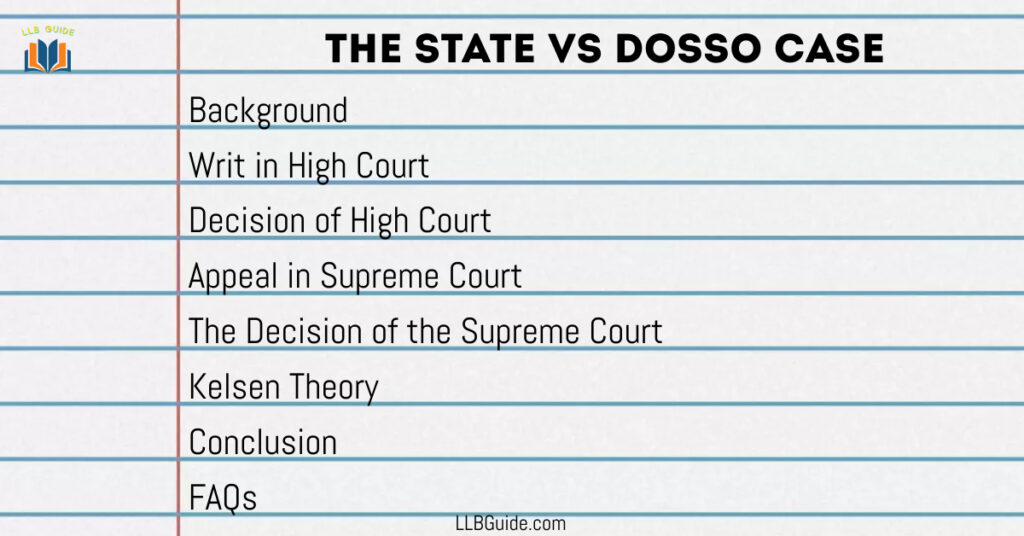The State Vs Dosso Case is the most important constitutional case in the history of Pakistan, in which the first Martial law imposed by General Ayub Khan was declared valid by the Supreme Court of Pakistan.

Table of Contents
The State Vs Dosso Case PLD 1958 SC 533
The state vs dosso case summary is described below in very simple words.

Background
Dosso was a tribal person, living in the Loralai District in Balochistan (which was under the FATA region). Dosso was charged with the murder of a person and the Council of Elders (the Jirga) decided against Dosso and convicted him guilty, sentenced to death him under Frontier Crime Regulations (FCR) 1901.
Writ in High Court
In dosso vs state case, the relatives of Dosso filed a writ petition in the High Court of West Pakistan (Quetta Seat) and challenged the order of the Council of Elders (the Jirga).
The main ground of this writ was:
- The Frontier Crime Regulations (FCR) 1901 is repugnant to Article 5 and Article 7 of the 1956 Constitution of Pakistan, which provide equality before the law and the right to counsel.
Decision of High Court
In Dosso vs state, the High Court of West Pakistan (Quetta Seat) decided in favor of Dosso:
- The High Court set aside the conviction of Dosso,
- It also declared that the Frontier Crime Regulations (FCR) 1901 is repugnant to Article 5 and Article 7 of the 1956 Constitution of Pakistan.
Appeal in Supreme Court
Now there was a problem for the Government: What will be the future of The Council of Elders? and what about the past decisions made by the Council of Elders? The people will get to the High Court and set aside the order of the Council of Elders in the same way.
The Federal Government appealed the decision of the High Court in the Supreme Court. The decision of this appeal was to be given on 13 October 1958.
On the 7th of October 1958, the first President of Pakistan Mr Iskandar Mirza declared martial law in the country and appointed the Chief of Army Staff, General Muhammad Ayub Khan as the Chief Martial Law Administrator in the country.
After three days on the 11th of October, a new legal order was published known as “Laws Continuance in Force Order 1958”. In this order, It was said that the country would be governed through this order and all the existing laws declared valid but the Constitution of 1956 was abrogated.
The Decision of the Supreme Court
In Dosso case the Chief Justice of Pakistan Justice Munir relied on Kelsen’s Theory and reversed the decision of the High Court. In State v Dosso:
It was held that:
- The Martial law imposed in the country was necessary because there was chaos in the country, so is valid.
- The new legal order, which abrogated the 1956 Constitution of Pakistan, is also valid.
- The new legal order also validated all the existing laws including FCR 1901.
- Whereas the Constitution is abrogated, the repugnancy of FCR 1901 to articles 5 and 7 of the Constitution is not possible.
- And the conviction of Dosso is correct and according to law.

Kelsen Theory
Kelsen’s theory is also known as the “Doctrine of Necessity“. According to this theory, “if a change happens in any country, in its government, or its Constitution, and such change is not resisted by anyone in the country like the opposition or the people, that means such change is a successful revolution and International Law recognizes it”.
Conclusion
As explained above in dosso case summary, State Vs Dosso Case is important and controversial. In the Doso case, the first Martial law imposed in the country was declared valid by relying on Kelsen’s Theory of Necessity. State vs Dosso was another important case after Molvi Tameez ud Din Case.
FAQs
What is the significance of the Dosso case?
Dosso’s case changed the politics of Pakistan by validating Martial law and opening the door for future ones.
Which judge had written a sole dissenting note in the state vs Dosso case?
A. R. Cornelius wrote a dissenting note.
What is the continuance in force order 1958?
Laws Continuance in Force Order 1958 was a new legal order published by General Ayub Khan after imposing Martial law.
What is the doctrine of necessary?
If a change happens in any country and is not resisted by anyone in the country, such change is a successful revolution.
What is the judgment of Dosso vs the state?
The High Court decided in favor of Dosso, declared FCR 1901 repugnant to Articles 5 and 7 of the 1956 Constitution but the Supreme Court reversed it on the basis of Kelsen’s Theory and also validated Martial law.

